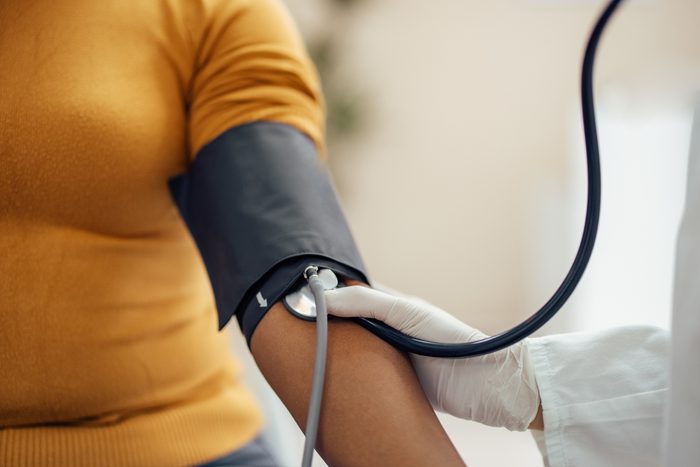New Study: Reducing This Ingredient Works as Well as Blood Pressure Medication
Updated: Dec. 06, 2023

A new study's revelation may speak to the 50% of Americans with hypertension...and best of all, the diet change is tiny.
Similar to obesity, heart problems, and pre-diabetes, blood pressure is one of those conditions that, in many cases, can be corrected with some gentle lifestyle changes. According to the Centers for Disease Control (CDC), nearly half of Americans have high blood pressure.
Many have discovered that the typical first line of defense in reducing blood pressure involves dietary changes, such as opting for foods lower in sodium, using less salt in your meals, and following the DASH diet, which is short for Dietary Approaches to Stop Hypertension. If these changes are unsuccessful, people are usually prescribed medication to lower their blood pressure and reduce the risk of heart attack and stroke.
However, the CDC estimates that only 25% of people with high blood pressure have their numbers under control. A recent study published on November 11, 2023, in the Journal of the American Medical Association (JAMA), aimed to determine the impact of reducing dietary sodium on these numbers, particularly among older individuals, including those already taking blood pressure medication. The researchers noted that this population, especially those already on blood pressure medication, was not thoroughly studied regarding the impact of dietary sodium.
The study found that reducing sodium was nearly as effective as a common blood pressure medication and also helped those already on medication lower their blood pressure even further, at least in the short term.
Even better, the amount of sodium people needed to cut to achieve these lower numbers was only about one teaspoon of salt—a manageable amount.
Over 200 people aged 50 to 75 participated in the study, following their regular diet, a low-sodium diet (500 milligrams), and a high-sodium diet (2,000 milligrams) for one week each. Blood pressure was tested after each week.
The results were that the low-sodium diet reduced systolic blood pressure by an average of eight mmHg (“millimeters of mercury,” a primary metric for pressures within the body) in over 75% of the subjects, a significant improvement that benefited even those on medication. The researchers concluded, “Our data demonstrate that the greatest impact on blood pressure compared with the usual diet is achieved through lowering sodium intake.” The study also emphasized the importance for people with high blood pressure who are on medication to continue eating healthfully and maintain a lower sodium intake.
The issue, of course, with this study is that lifestyle changes would need to be maintained for blood pressure to remain lower. The researchers noted that once a subject returned to their old eating habits or consumed a higher sodium diet, their blood pressure increased again. However, they suggest that even if the regimen is challenging to stick to, counseling patients on lowering their sodium intake as a quick way to lower blood pressure is worth considering, in addition to management with medication.
Here’s How Often You Should Actually Take Your Blood Pressure, According to a Cardiologist
How to lower sodium in your diet
The most straightforward way to reduce sodium intake is by preparing your own meals from fresh meat and produce. However, this isn’t always practical or cost-effective. Here are some additional tips from the CDC for lowering sodium in your diet:
At the grocery store:
- Carefully read nutrition labels when buying canned or packaged foods, paying attention to the serving size to assess sodium intake.
- Check whether meats are processed or injected with saline solutions. Marinated products may also contain higher levels of sodium.
At home:
- Use less salt when cooking, and consider opting for spices and citrus juices to enhance flavor.
- Be cautious with condiments and limit the use of sauces, as they often contain higher sodium levels.
At a restaurant:
- Request that your food be prepared without extra salt, and review the nutrition information before dining out.
- Be mindful of heavy sauces and fried foods, as they can often hide additional sodium.
- 7 Drinks That Lower High Blood Pressure
- Cutting This Condiment Could Reduce Your Diabetes Risk, New Study Says
- I Ate Potatoes Every Day for a Week—Here’s What Happened
- How Much Caffeine Is In Coffee? Cleveland Clinic Experts Explain
- 5 Worst Foods for Your Immune System, Say Experts
- 4 Best Supplements to Lower Your Blood Pressure




















